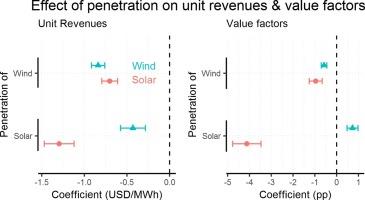The cannibalization effect of wind and solar in the California wholesale electricity market |
| |
| Affiliation: | 1. Wegener Center for Climate and Global Change, University of Graz, Austria;2. Department of Economics, University of Graz, Austria;3. Department of Agricultural and Resource Economics, University of California Berkeley, United States |
| |
| Abstract: | 
Increasing penetration of zero marginal cost variable renewable technologies cause the decline of wholesale electricity prices due to the merit-order effect. This causes a “cannibalization effect” through which increasing renewable technologies’ penetration undermines their own value. We calculate solar and wind daily unit revenues (generation weighted electricity prices) and value factors (unit revenues divided by average electricity prices) from hourly data of the day-ahead California wholesale electricity market (CAISO) for the period January 2013 to June 2017. We then perform a time series econometric analysis to test the absolute (unit revenues) and relative (value factors) cannibalization effect of solar and wind technologies, as well as the cross-cannibalization effects between technologies. We find both absolute and relative cannibalization effect for both solar and wind, but while wind penetration reduces the value factor of solar, solar penetration increases wind value factor, at least at high penetration and low consumption levels. We explore non-linearities and also find that the cannibalization effect is stronger at low consumption and high wind/solar penetration levels. This entails that wind and (mainly) solar competitiveness could be jeopardized unless additional mitigation measures such as storage, demand management or intercontinental interconnections are taken. |
| |
| Keywords: | Variable renewable energy Merit-order effect Value factor Unit revenues |
| 本文献已被 ScienceDirect 等数据库收录! |
|

